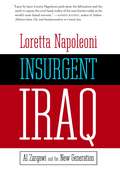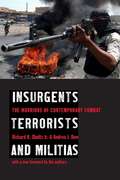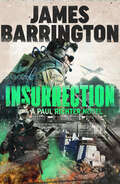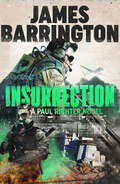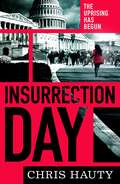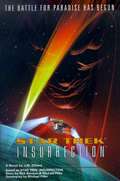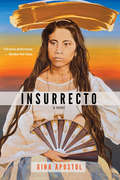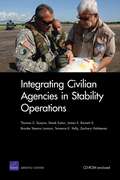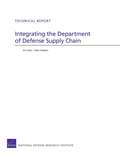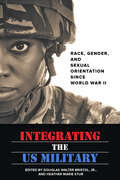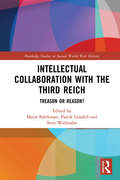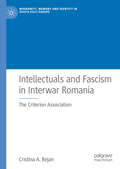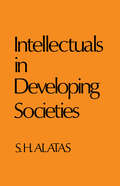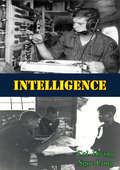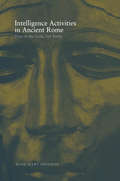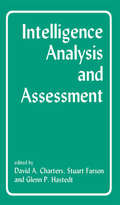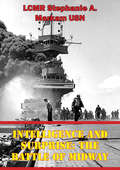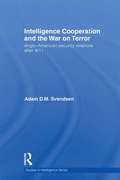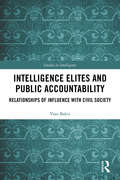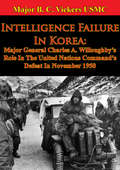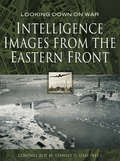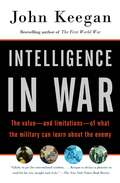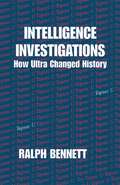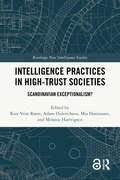- Table View
- List View
Insurgent Iraq: Al Zarqawi and the New Generation
by Loretta Napoleoni Jason Burke Nick FieldingAn unparalleled look into the Iraqi insurgency and the multitude of forces that continue to shape it, Insurgent Iraq: Al-Zarqawi and the New Generation presents a chilling account of the regrouping of terror networks, and the development of an Iraqi resistance since the invasion by coalition forces over two years ago. One of the world's leading specialists on terrorism, economist Loretta Napoleoni is uniquely qualified to make sense of the ways in which terror networks do and do not operate in Iraq, and what role they play in the Iraqi resistance. Is the insurgency in Iraq a counter-Crusade, a national liberation movement, or a civil war? With a complex understanding of all the intricacies inherent in such a question, Napoleoni provides a mindful discussion, offering a much-needed understanding of how the US occupation of Iraq has catalyzed the cultural, religious, and political divides within the country to create a wholly changed, more volatile landscape. Composed of independent Iraqi Jihadist groups, Islamo-Nationalist and Ba'ath party resistance, ethnic infighting between Sunni, Shi'ite and Kurd, and foreign suicide bombers, the resistance is a divided yet maintains one demand: the end of US occupation. Overall, Napoleoni offers a breakdown of the current political landscape in Iraq, and a renovated al-Qaeda. Insurgent Iraq is a necessary read for anyone concerned with the future of Iraq, or seeking greater insight into the U.S.'s critical role in the Middle East.
Insurgents, Terrorists, and Militias: The Warriors of Contemporary Combat
by Richard Shultz Jr. Andrea DewSince the end of the Cold War, conventional militaries and their political leaders have confronted a new, brutal type of warfare in which non-state armed groups use asymmetrical tactics to successfully fight larger, technologically superior forces. In order to prevent future bloodshed and political chaos, it is crucial to understand how these unconventional armed groups think and to adapt to their methods of combat.Richard H. Shultz Jr. and Andrea J. Dew investigate the history and politics of modern asymmetrical warfare. By focusing on four specific hotbeds of instability—Somalia, Chechnya, Afghanistan, and Iraq—Shultz and Dew conduct a careful analysis of tribal culture and the value of clan associations. They examine why these "traditional" or "tribal" warriors fight, how they recruit, where they find sanctuary, and what is behind their strategy. Traveling across two centuries and several continents, Shultz and Dew examine the doctrinal, tactical, and strategic advantages and consider the historical, cultural, and anthropological factors behind the motivation and success of the warriors of contemporary combat.In their provocative argument, Shultz and Dew propose that war in the post-Cold War era cannot be waged through traditional Western methods of combat, especially when friendly states and outside organizations like al-Qaeda serve as powerful allies to the enemy. Thoroughly researched and highly readable, Insurgents, Terrorists, and Militias examines how non-state armies fight, identifies the patterns and trends of their combat, and recommends how conventional militaries can defeat these irregular yet highly effective organizations.
Insurgents, Terrorists, and Militias: The Warriors of Contemporary Combat
by Andrea J. Dew Richard H. Shultz Jr.Since the end of the Cold War, conventional militaries and their political leaders have confronted a new, brutal type of warfare in which non-state armed groups use asymmetrical tactics to successfully fight larger, technologically superior forces. In order to prevent future bloodshed and political chaos, it is crucial to understand how these unconventional armed groups think and to adapt to their methods of combat. Richard H. Shultz Jr. and Andrea J. Dew investigate the history and politics of modern asymmetrical warfare. By focusing on four specific hotbeds of instability-Somalia, Chechnya, Afghanistan, and Iraq-Shultz and Dew conduct a careful analysis of tribal culture and the value of clan associations. They examine why these "traditional" or "tribal" warriors fight, how they recruit, where they find sanctuary, and what is behind their strategy. Traveling across two centuries and several continents, Shultz and Dew examine the doctrinal, tactical, and strategic advantages and consider the historical, cultural, and anthropological factors behind the motivation and success of the warriors of contemporary combat. In their provocative argument, Shultz and Dew propose that war in the post-Cold War era cannot be waged through traditional Western methods of combat, especially when friendly states and outside organizations like al-Qaeda serve as powerful allies to the enemy. Thoroughly researched and highly readable, Insurgents, Terrorists, and Militias examines how non-state armies fight, identifies the patterns and trends of their combat, and recommends how conventional militaries can defeat these irregular yet highly effective organizations.
Insurrection (Agent Paul Richter Thriller)
by James BarringtonPaul Richter returns in his most dangerous mission yet.In Syria, a ritualistic ISIS beheading seems like another barbaric part of a terrible war. But this time is different…In London, Paul Richter is briefed about a series of seemingly unconnected events, notably a terrifying spate of seemingly random shootings in America. Something doesn’t quite fit. Before long Richter is on the case and in the line of fire.It seems a plot far bigger than anyone could have imagined is brewing from the mountains of the Hindu Kush and the deserts of Syria to the heart of Middle America.With no information, the clock is ticking for Richter – and millions of innocent lives.For readers of James Patterson, Will Jordan and Chris Ryan, the Agent Paul Richter series is intense, visceral and totally unmissable.
Insurrection (An Agent Paul Richter Thriller)
by James BarringtonPaul Richter returns in his most dangerous mission yet.In Syria, a ritualistic ISIS beheading seems like another barbaric part of a terrible war. But this time is different…In London, Paul Richter is briefed about a series of seemingly unconnected events, notably a terrifying spate of seemingly random shootings in America. Something doesn’t quite fit. Before long Richter is on the case and in the line of fire.It seems a plot far bigger than anyone could have imagined is brewing from the mountains of the Hindu Kush and the deserts of Syria to the heart of Middle America.With no information, the clock is ticking for Richter – and millions of innocent lives.For readers of James Patterson, Will Jordan and Chris Ryan, the Agent Paul Richter series is intense, visceral and totally unmissable.
Insurrection Day: The gripping new Hayley Chill novella
by Chris HautyTHE UPRISING HAS BEGUN Hayley Chill has twenty-four hours to stop a violent revolt. The insurrection, taking the form of a storming of the Capitol Building, appears to be wholly spontaneous and disorganized. But is it? As the situation spirals out of control, authorities on the ground are utterly unprepared to protect the nation's elected representatives from the crowd's vengeance. When Hayley Chill rescues a powerful senator and his staff from the mob&’s clutches, she discovers shocking evidence that the uprising is led by one of the country&’s longstanding adversaries. Non-stop action shifts from Capitol Hill to a pursuit across Washington DC as Hayley chases down foreign operatives to make them answer for their crimes. Partly inspired by true events, this is a blistering novella featuring much-loved series character, Hayley Chill, and her fight against the powerful forces that threaten to overthrow democracy. Praise for Chris Hauty 'Hayley Chill is relentlessly smart and brave in this twisty, electrifying thriller' KARIN SLAUGHTER 'Full of twists, this one will keep you hooked to the very end' JAMES SWALLOW 'One of the most surprising double-reverse plot twists I have seen in some time' NEW YORK TIMES &‘Brilliantly fast-moving and absorbing&’ SUNDAY TIMES CRIME CLUB The HAYLEY CHILL thriller series #1 DEEP STATE #2 SAVAGE ROAD #3 STORM RISING
Insurrection: Star Trek Ix Movie Novelization (Star Trek )
by J. M. DillardStar Trek: The Next Generation is the most popular, longest-running series in science fiction history. Now, after the spectacular worldwide success of Star Trek: First Contact, Captain Jean-Luc Picard and the crew of the Starship Enterprise return to the big screen in a thrilling new adventure that captures all the fun and excitement of Star Trek at its best.Star Trek: Insurrection reunites the hugely popular crew of Star Trek: The Next Generation: Jean-Luc Picard, Starfleet's finest officer; Commander William T. Riker, his stalwart first officer; Lieutenant Commander Data, the indispensable android; Commander Deanna Troi, the empathic Betazoid counselor; Lieutenant Commander Worf, the fierce Klingon warrior; Lieutenant Commander Geordi La Forge, chief of engineering; and Dr. Beverly Crusher, the ship's able medical officer. Together, they have faced many challenges over the years, but nothing has prepared them for the unexpected crisis that tests both their skills and their convictions. On an unnamed planet in a distant sector, Starfleet, in an uneasy alliance with a mysterious new alien species of unknown origin, has discovered a secret with astounding implications that could transform the future of the entire Federation. But this secret has a price that may be more than some are willing to pay. The secret first turns Data against Starfleet, then draws Jean-Luc Picard and the Starship Enterprise into a tense and dangerous situation that has unexpected effects on every member of the crew -- and presents them with an agonizing moral dilemma. Faced with orders he cannot obey and a crisis he cannot ignore, Picard finds himself torn between his conscience and his uniform. Bestselling author J. M. Dillard has written a powerful and exciting novel based on the major motion picture directed by Jonathan Frakes ("Commander William T. Riker"). Star Trek: Insurrection is sure to delight audiences throughout the world.
Insurrecto
by Gina ApostolHistories and personalities collide in this literary tour-de-force about the Philippines’ present and America’s past by the PEN Open Book Award–winning author of Gun Dealers’ Daughter. Two women, a Filipino translator and an American filmmaker, go on a road trip in Duterte’s Philippines, collaborating and clashing in the writing of a film script about a massacre during the Philippine-American War. Chiara is working on a film about an incident in Balangiga, Samar, in 1901, when Filipino revolutionaries attacked an American garrison, and in retaliation American soldiers created “a howling wilderness” of the surrounding countryside. Magsalin reads Chiara’s film script and writes her own version. Insurrecto contains within its dramatic action two rival scripts from the filmmaker and the translator—one about a white photographer, the other about a Filipino schoolteacher. Within the spiraling voices and narrative layers of Insurrecto are stories of women—artists, lovers, revolutionaries, daughters—finding their way to their own truths and histories. Using interlocking voices and a kaleidoscopic structure, the novel is startlingly innovative, meditative, and playful. Insurrecto masterfully questions and twists narrative in the manner of Italo Calvino’s If on a Winter’s Night a Traveler, Julio Cortázar’s Hopscotch, and Nabokov’s Pale Fire. Apostol pushes up against the limits of fiction in order to recover the atrocity in Balangiga, and in so doing, she shows us the dark heart of an untold and forgotten war that would shape the next century of Philippine and American history.
Integrating Civilian Agencies in Stability Operations
by Terrence K. Kelly Derek Eaton Brooke Stearns Lawson Thomas S. Szayna James E. BarnettHow can the Army help make key civilian agencies more capable partners in stability, security, transition, and reconstruction (SSTR) operations? The authors identify the civilian agencies that should be involved in such operations, then locate the necessary skill sets. They then assess the capacity of the civilian agencies to participate in SSTR operations and analyze the recurring structural problems that have plagued their attempts to do so.
Integrating the Department of Defense Supply Chain
by Eric Peltz Marc Robbins Geoffrey McgovernThe authors provide a framework for an integrated Department of Defense (DoD) supply chain, associated policy recommendations, and a companion framework for management practices that will drive people to take actions aligned with this integrated supply chain approach. Building on the framework and policy recommendations, they identify opportunities to improve DoD supply chain efficiency and highlight several already being pursued by DoD.
Integrating the US Military: Race, Gender, and Sexual Orientation since World War II
by Douglas Walter Bristol, Jr., and Heather Marie SturHow have the US Armed Forces been transformed by integration?One of the great ironies of American history since World War II is that the military—typically a conservative institution—has often been at the forefront of civil rights. In the 1940s, the 1970s, and the early 2000s, military integration and promotion policies were in many ways more progressive than similar efforts in the civilian world. Today, the military is one of the best ways for people from marginalized groups to succeed based solely on job performance.Integrating the US Military traces the experiences of African Americans, Japanese Americans, women, and gay men and lesbians in the armed forces since World War II. By examining controversies from racial integration to the dismantling of "Don’t Ask, Don’t Tell" to the recent repeal of the ban on women in combat, these essays show that the military is an important institution in which social change is confirmed and, occasionally, accelerated. Remarkably, the challenges launched against the racial, gender, and sexual status quo in the postwar years have also broadly transformed overarching ideas about power, citizenship, and America’s role in the world.The first comparative study of legally marginalized groups within the armed services, Integrating the US Military is a unique look at the history of military integration in theory and in practice. The book underscores the complicated struggle that accompanied integration and sheds new light on a broad range of comparable issues that affect civilian society, including affirmative action, marriage laws, and sexual harassment.
Intellectual Collaboration with the Third Reich: Treason or Reason? (Routledge Studies in Second World War History)
by Maria Björkman Patrik Lundell Sven WidmalmThe book investigates the rather neglected "intellectual" collaboration between National Socialist Germany and other countries, including views on knowledge and politics among "pro-German" intellectuals, using a comparative approach. These moves were shaped by the Nazi system, which viewed scientific and cultural exchange as part and parcel of their cultural propaganda and policy. Positive views of the Hitler regime among intellectuals of all sorts were indicative of a broader discontent with democracy that, among other things, represented an alternative approach to modernization which was not limited to the German heartlands. This book draws together international experts in an analysis of right-wing Europe under Hitler; a study which has gained new resonance amidst the wave of European nationalism in the twenty-first century.
Intellectuals and Fascism in Interwar Romania: The Criterion Association (Modernity, Memory and Identity in South-East Europe)
by Cristina A. BejanIn 1930s Bucharest, some of the country’s most brilliant young intellectuals converged to form the Criterion Association. Bound by friendship and the dream of a new, modern Romania, their members included historian Mircea Eliade, critic Petru Comarnescu, Jewish playwright Mihail Sebastian and a host of other philosophers and artists. Together, they built a vibrant cultural scene that flourished for a few short years, before fascism and scandal splintered their ranks. Cristina A. Bejan asks how the far-right Iron Guard came to eclipse the appeal of liberalism for so many of Romania’s intellectual elite, drawing on diaries, memoirs and other writings to examine the collision of culture and extremism in the interwar years. The first English-language study of Criterion and the most thorough to date in any language, this book grapples with the complexities of Romanian intellectual life in the moments before collapse.
Intellectuals in Developing Societies
by Hussein AlatasFirst published in 1977. Routledge is an imprint of Taylor & Francis, an informa company.
Intelligence (Indochina Monographs #2)
by Col. Hoang Ngoc LungIncludes over 10 maps and illustrationsThis monograph forms part of the Indochina Monograph series written by senior military personnel from the former Army of the Republic of Vietnam who served against the northern communist invasion."The war in Vietnam was often called an intelligence war. The challenges and responsibilities placed on the South Vietnam--United States--Free World intelligence community were great and constant.During this long war the entire intelligence program improved each day as our data base expanded, as more was learned about the elusive enemy, personnel were trained, and new procedures and techniques were tested and found effective.The most rewarding experience in intelligence activities during the Vietnam war was the very close cooperation and coordination between American and Vietnamese military intelligence personnel and systems. It was this cooperation that helped RVNAF military intelligence upgrade and become self-reliant during the post-cease-fire period.This monograph attempts to record all the facts concerning intelligence activities, its organizations and coordination procedures, its successes and failures during the period from 1965 to the final days of the Republic of Vietnam. In this attempt, one of the difficulties I faced was the lack of documentation to help make my work more accurate and more substantial. To overcome this shortcoming, I have interviewed several former colleagues of mine, American and Vietnamese, all of them highly experienced with intelligence activities in Vietnam. Apart from their invaluable contributions, most of the writing was based on my personal knowledge and experience."-Author's Preface.
Intelligence Activities in Ancient Rome: Trust in the Gods but Verify (Studies in Intelligence)
by Rose Mary SheldonProfessor Sheldon uses the modern concept of the intelligence cycle to trace intelligence activities in Rome whether they were done by private citizens, the government, or the military. Examining a broad range of activities the book looks at the many types of espionage tradecraft that have left their traces in the ancient sources: * intelligence and counterintelligence gathering* covert action* clandestine operations* the use of codes and ciphers Dispelling the myth that such activities are a modern invention, Professor Sheldon explores how these ancient spy stories have modern echoes as well. What is the role of an intelligence service in a free republic? When do the security needs of the state outweigh the rights of the citizen? If we cannot trust our own security services, how safe can we be? Although protected by the Praetorian Guard, seventy-five percent of Roman emperors died by assassination or under attack by pretenders to his throne. Who was guarding the guardians? For students of Rome, and modern social studies too - this will provide a fascinating read.
Intelligence Analysis and Assessment (Studies in Intelligence)
by David A. Charters Glenn P. Hastedt A. Stuart FarsonThese essays cover: assessment systems now in place in Britain, the USA, Germany and Australia; the bureaucratic dynamics of analysis and assessment; the changing ground in intelligence; and the impact of new technologies and modes of communication on intelligence gathering and analysis.
Intelligence And Surprise: The Battle Of Midway
by LCMR Stephanie A. Markam USNIntelligence is a key element in the military strategy of surprise. It is perplexing to many that in today's high technology environment that intelligence cannot prevent surprises from happening. The very nature of the intelligence, no matter how much or how sophisticated it is, will still permit one adversary to surprise another. It is crucial that the operational commander have a clear understanding of the process of the production of intelligence, the uses of intelligence and how it can affect the strategy of surprise. The dramatic success of the Battle of Midway, coming so closely on the heels of the shocking disaster at Pearl Harbor, demonstrated that Admiral Nimitz gained an appreciation for the value of intelligence. I will examine intelligence and the strategy of surprise in general terms and shows how the battle of Midway was influenced by them. Finally, I want to point out that though today's operations may be more sophisticated than those of World War II, there are plenty of critical concerns to consider today with regard to intelligence and surprise at the operational level.
Intelligence Cooperation and the War on Terror: Anglo-American Security Relations after 9/11 (Studies in Intelligence)
by Adam D.M. SvendsenThis book provides an in-depth analysis of UK-US intelligence cooperation in the post-9/11 world. Seeking to connect an analysis of intelligence liaison with the wider realm of Anglo-American Relations, the book draws on a wide range of interviews and consultations with key actors in both countries. The book is centred around two critical and empirical case studies, focusing on the interactions on the key issues of counterterrorism and weapons of mass destruction (WMD) counter-proliferation. These case studies provide substantive insights into a range of interactions such as 9/11, the 7/7 London bombings, the A.Q. Khan nuclear network, the prelude to the 2003 Iraq War, extraordinary rendition and special forces deployments. Drawing on over 60 interviews conducted in the UK and US with prominent decision-makers and practitioners, these issues are examined in the contemporary historical context, with the main focus being on the years 2000-05. This book will be of much interest to students of intelligence studies, foreign policy, security studies and International Relations in general. Adam Svendsen has a Phd in International History from the University of Warwick. He has been a Visiting Scholar at the Center for Peace and Security Studies, Georgetown University, and has contributed to the International Security Programme at Chatham House and to the work of IISS, London.
Intelligence Elites and Public Accountability: Relationships of Influence with Civil Society (Studies in Intelligence)
by Vian BakirThis book provides a definitive overview of the relationships of influence between civil society and intelligence elites. The secrecy surrounding intelligence means that publication of intelligence is highly restricted, barring occasional whistle-blowing and sanitised official leaks. These characteristics mean that intelligence, if publicised, can be highly manipulated by intelligence elites, while civil society’s ability to assess and verify claims is compromised by absence of independent evidence. There are few studies on the relationship between civil society and intelligence elites, which makes it hard to form robust assessments or practical recommendations regarding public oversight of intelligence elites. Addressing that lacuna, this book analyses two case studies of global political significance. The intelligence practices they focus on (contemporary mass surveillance and Bush-era torture-intelligence policies) have been presented as vital in fighting the ‘Global War on Terror’, enmeshing governments of scores of nation-states, while challenging internationally established human rights to privacy and to freedom from torture and enforced disappearance. The book aims to synthesise what is known on relationships of influence between civil society and intelligence elites. It moves away from disciplinary silos, to make original recommendations for how a variety of academic disciplines most likely to study the relationship between civil society and intelligence elites (international relations, history, journalism and media) could productively cross-fertilise. Finally, it aims to create a practical benchmark to enable civil society to better hold intelligence elites publicly accountable. This book will be of great interest to students of intelligence studies, surveillance, media, journalism, civil society, democracy and IR in general.
Intelligence Failure In Korea: Major General Charles A. Willoughby’s Role In The United Nations Command’s Defeat In November 1950
by Major Justin M. HaynesIn November, 1950, the United States Army suffered one of its most devastating defeats ever, in the frozen mountains of North Korea at the hands of the Chinese People's Liberation Army. This defeat fundamentally changed the nature of the Korean War, from a near-certain United Nations victory into a fight for its very survival. It was, however, avoidable.This Chinese victory was partially the result of one of the most glaring failures in U.S. military intelligence history. The officer most responsible for this failure was the Far East Command Assistant Chief of Staff for Intelligence (G2), Major General Charles Andrew Willoughby. His inaccurate intelligence picture contributed to General of the Army Douglas MacArthur's flawed understanding of the nature of the Chinese Communist intent.Charles Willoughby correctly identified the potential threat of a Chinese Communist intervention in Korea in late 1950, yet failed to acknowledge the significance of China's strategic warnings, operational preparations for war and tactical confirmation of their intentions. Willoughby's flawed assessment of Chinese intentions in the fall of 1950 was a result of rampant mirror imaging, complicated by circular analysis stemming from his exclusive control over intelligence reporting on the Korean theater. His significant personal prejudices against the Chinese ability fight exacerbated this problem. Once the United Nations Command undeniably confirmed that Chinese forces had entered North Korea, he minimized their significance in order to support MacArthur's final offensive to the Yalu River in late November, ultimately resulting in the defeat of his command.
Intelligence Images from the Eastern Front (Looking Down on War)
by Colonel Roy M. Stanley IIDespite the Luftwaffe being ordered to destroy millions of aerial photos in 1945, the Allies found no less than twenty tons of photos in eleven locations, including a hoard in a Bavarian barn. These together with vast numbers of photographs taken by German soldiers used for Intelligence analysis were put into classified Allied Intelligence files at a time when USAAF and RAF imagery was being destroyed. Covering Iron Curtain countries they were valuable for cartography and target intelligence during the Cold War.The captured German imagery (called GX) in this book show what the German Army knew about the Soviet Union before and during Operation Barbarossa. Examples show Eastern Front landforms, key cities such as Stalingrad, Moscow, Sevastopol, Leningrad and factories. They are accompanied by helpful comments from a skilled photo interpreter.This unique and diverse collection, some taken from 28,000 feet overhead, others taken by soldiers on the ground, reveal the war on the Eastern Front as it has never been seen before.
Intelligence In War: The Value--and Limitations--of What The Military Can Learn About The Enemy
by John KeeganA masterly look at the value and limitations of intelligence in the conduct of war from the premier military historian of our time, John Keegan. Intelligence gathering is an immensely complicated and vulnerable endeavor. And it often fails. Until the invention of the telegraph and radio, information often traveled no faster than a horse could ride, yet intelligence helped defeat Napoleon. In the twentieth century, photo analysts didn’t recognize Germany’s V-2 rockets for what they were; on the other hand, intelligence helped lead to victory over the Japanese at Midway. In Intelligence in War, John Keegan illustrates that only when paired with force has military intelligence been an effective tool, as it may one day be in besting al-Qaeda.
Intelligence Investigations: How Ultra Changed History (Studies in Intelligence)
by Ralph BennettMilitary intelligence, grossly neglected during the interwar period, had by mid-1942 proved itself indispensable through information gathered from intercepted radio messages in the supposedly unbreakable German Enigma cipher. Ralph Bennett, who worked for four years at Bletchley Park as a senior producer of the intelligence (Ultra') derived from the Enigma decrypts, illustrates in this collection of reprinted essays some of the steps by which he and others developed the new type of information and in the process a candid glimpse of the workings of British intelligence both past and present.
Intelligence Practices in High-Trust Societies: Scandinavian Exceptionalism? (Routledge New Intelligence Studies)
by Kira Vrist Rønn Adam Diderichsen Mia Hartmann Melanie HartvigsenThis book examines the dynamics of intelligence practices in the Scandinavian culture of high social cohesion and high trust.Situated within the new body of scholarly literature, the book emphasizes critical empirical investigations of intelligence practices, highlighting the specific cultural settings of such practices. By providing Scandinavian perspectives on intelligence studies, the work distinguishes Scandinavian intelligence studies from the predominant Anglo-American perspectives. Throughout the Western world, the past two decades have generated a rapid expansion of the legal mandate, funding, and capabilities of intelligence agencies which, simultaneously, have been pushed to renegotiate and renew their legitimacy and democratic mandate in response to a recurrent pattern of scandals, leaks, and failures. While these tendencies are also evident in Scandinavia, the book argues that it is important to emphasize the unique context of cohesion and trust in state agencies that differentiates Scandinavian welfare states from the American (and to a lesser extent British) contexts. This book brings together scholars from Norway, Sweden, and Denmark to address the continuous renegotiation of the legitimacy of state intelligence as it plays out in a Scandinavian setting.This book will be of interest to students of intelligence studies, Nordic politics, security studies, and International Relations.
